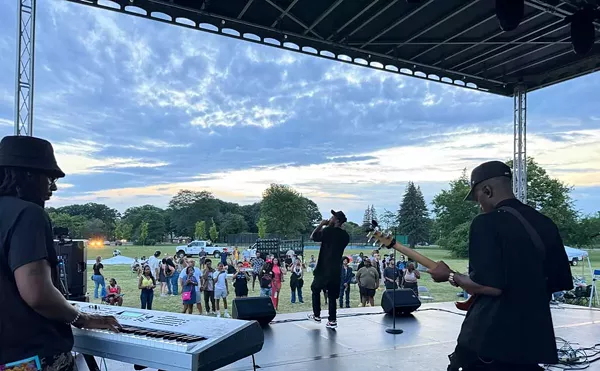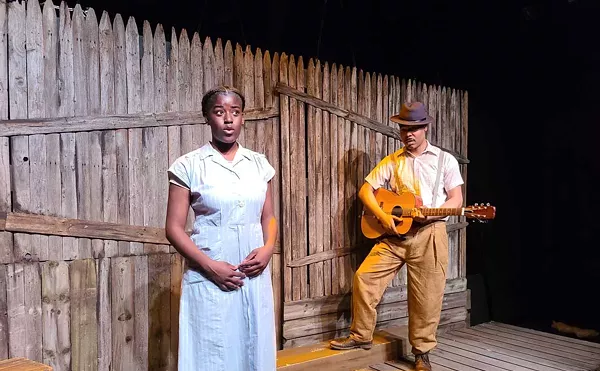Soul kitchen
It's about the shared inability to afford something as necessary to life as a meal

Audio By Carbonatix
[
{
"name": "GPT - Leaderboard - Inline - Content",
"component": "35519556",
"insertPoint": "5th",
"startingPoint": "3",
"requiredCountToDisplay": "3",
"maxInsertions": 100,
"adList": [
{
"adPreset": "LeaderboardInline"
}
]
}
]
They stand in line so patiently, you'd never know some of them haven't eaten since yesterday.
The line's so long it winds from the soup kitchen door along the wall and around the corner to the back, then curves down the alley and out to the street on the side. And no matter how hard the wind blows or how heavy the rain falls, they wait politely. By the end of the day, a thousand of them will have stood here.
The crowd is a mix of those who are somewhat poor to those who are desperately so. Some are homeless and have to scrounge every meal, while others are just short on their assistance at some point each month and need a little help. But once in line the distinctions are blurred. They're just hungry people waiting for a meal.
Here is Jean Kahn, 72 and slight, who walked a mile to eat today. And here is Jessica Rodnez, 23, who works at McDonald's and just started nursing school, but whose food stamps don't cover a month's worth of meals for her and her two young children, who've come with her, bundled in winter clothes. Here is glassy-eyed Billy Rogers, 52, who's waiting on a dishwashing job he says he's sure to get any day, though the wait so far has been 16 years. And here is Sidney Lester Williams, a name the 72-year-old offers with aristocratic flourish. He's a well-dressed gentleman who, like some here today, isn't really here anymore in a sense. "My father was a wizard, mother was a witch," he announces.
Inside the door, Saundra Richardson sits alone at a small table, same as every Sunday, waiting for the hungry to pour into the building. She's like the lunchlady and doorman in one, the person who instructs the volunteers making the meals, the one those in line have to see before eating one. And whether it's due to her calm demeanor or the white clerical collar she wears, everyone is soft-spoken and polite when they approach her.
An Episcopal minister since 1990, Richardson spends her weekdays working at Mariners Inn on Cass, a substance abuse treatment center, and spends her Sundays at this table, inside the Crossroads Soup Kitchen on West Grand Boulevard near 14th Street. The two jobs leave her no time to preach at a church. "My altar is a soup pot," the 63-year-old says.
To eat, each person in line has to get a little paper ticket from the big roll Richardson holds in her hands. Each person gets one ticket, and each ticket gets one meal. A handful of those in line are allowed additional tickets for someone ill or infirm back at home, but that absent person has to be on the extras list. There are so many people in line that if someone takes more than one meal just for themselves, some in line might not get anything at all.
No proof of income or need is required to get food. "We'll take anybody who wants to come in, anybody who wants a meal," says Nicole Harris, the 31-year-old associate director of Crossroads, waiting for the door to open and the room to fill.
About two-dozen volunteers scramble in the kitchen, ladling soup out of massive pots, making ham and cheese sandwiches one by one, pouring coffee or lemonade into Styrofoam cups, and meeting face to face, one at a time, with a thousand single casualties of bad times and hard lives.
"People are people, and they're just a little down on their luck," says volunteer David Schull, 52. "These are just people wanting to make a living, wanting to have a life. And everybody that could possibly pitch in to help them out, if they would, things would be a lot better in this area of Detroit."
Crossroads does a little of everything for the poor, because there are so many ways the poor can use help.
They offer counseling, employment assistance, a food pantry, a clothes closet. They let the clients, as they're called here, use their copiers and fax machines to try to find work. Sometimes they'll buy someone their prescription medicine for the month, or help with a late utility bill, or cover overdue rent, or buy someone a bus pass to get them to a new job until they start getting regular paychecks. They'll help people get new IDs, work boots, tool belts, eyeglasses.
So this place becomes the general go-to spot for those who are struggling. Although hundreds of homeless stand in that Sunday morning line, many who come here have simply fallen into poverty but are just one or two factors away from rising above it.
"I would say more than half, if given the opportunity, could make it," Harris says. "If they could get into some kind of job training program, if they could get into some kind of supportive housing program, if they could get support for child care, if they could get their GED, then they could make it."
Crossroads was founded in 1971 by Father James McLaren, an Episcopal priest at the Cathedral Church of St. Paul at Woodward and Warren, to offer general outreach to the poor of the area. It began in a small church office, moved to a Midtown building when the demand proved too great, and then to this west side location four years ago when even more space was needed. A small office on Jefferson serves the east side too. Everything's funded through donations.
Back in Midtown, the clients were mostly single men. At this building, there are a lot more families and single mothers from the neighborhood. And nobody who visits here is ever forgotten.
There are reams of paper files upstairs for every single person who's passed through the doors. "We are still real old school," Harris says, showing a 2-inch-thick file. "Clients will have us keep their birth certificates or their Social Security cards, and I think that's a big reason why we haven't gotten away from the paper files, because this is like mom's house for a lot of people. It's like their safe deposit boxes."
Though the homeless will often float between different agencies in town depending on what they need on a given day, some grow attached to Crossroads because of all that's offered under one roof. Recently, the county morgue called Harris to say they found a homeless person dead in the street. She got the call because the one piece of ID he had on him was his Crossroads card. "We hadn't seen him in about 10 years," she says. "But he still had our card in his wallet."
Jesse Travis, 30, walks meekly into the soup kitchen. "Where do I sign up for the food?" he asks Richardson. It's his first time here.
"No, you just get a ticket," Richardson replies, giving him one. He looks relieved that it's this easy.
It's noon. The door has just opened and the line has moved inside. Long white tables offer space for 175 people to sit and eat. But there are usually plenty of seats open, since most clients seem to prefer takeout, wandering back into the cold to eat somewhere alone.
Travis chooses to stay, takes the chili and a ham and cheese sandwich served today, sits alone and eats while looking around, curiously. A friend tipped him off to these Sunday lunches.
He's open about his circumstances. "I have a mental disability," he says, matter-of-factly. "I receive Social Security disability every month but it's not enough to cover my bills, not enough to cover all my expenses, so I came here." He had attended a good college, held a great job, then a bad breakup with a girlfriend when he was 20 years old led to him hearing voices and seeing things, he says. He was diagnosed with schizophrenia.
"Life just went downhill from there," he says. "A lot of my life has been lost because I've been focusing mostly on my illness."
Loss like his defines the lives of those in line — loss of their job, or their home, or their sanity. Loss, somehow, of their old life. The causes are different but the effect is the same — a shared inability to afford something as basic to life as a meal. That common fate brings them together here, at a place that offers each of them just about any kind of help to rise out of this life.
After a couple of hours the line finally dwindles. The volunteers grab bowls of soup and sit with those who they just served, those who but for a few wrong choices or turns of bad fortune, turn out to be not that different from them.
"So many people come down and say they realize they have way more in common with the people that we serve than they ever thought," Harris says. "You know, we all kind of want the same things — everybody wants to be able to provide for themselves, and we have a lot of the same values. We think that we're coming down to serve them, but we have a lot more in common with the poor than we'd like to admit."





